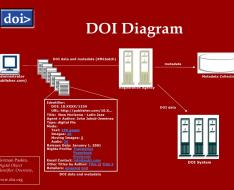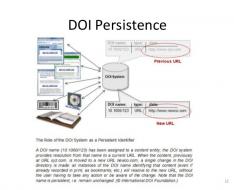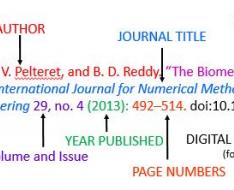A question that faces us as we move towards publishing our first major authored articles on the website is whether or not we should assign them Digital Object Identifiers (DOI or doi, according to taste).
Fuller information about DOIs can be found on the doi.org website or on wikipedia but, briefly, DOIs are intended to provide permanent identification ("persistent identifiers") of objects whose identity might otherwise shift, the classic example being an online resource where the address (URL or universal resource locator) changes, producing what is tastefully known as "linkrot" (aka "404 page errors").
Wikipedia sums it up as follows:
"A digital object identifier (DOI) is a character string (a "digital identifier") used to uniquely identify an object such as an electronic document. Metadata about the object is stored in association with the DOI name and this metadata may include a location, such as a URL, where the object can be found. The DOI for a document remains fixed over the lifetime of the document, whereas its location and other metadata may change. Referring to an online document by its DOI provides more stable linking than simply referring to it by its URL, because if its URL changes, the publisher need only update the metadata for the DOI to link to the new URL.[1][2][3]
Perhaps surprisingly in the context of how DOIs are used, a DOI is not an identifier of a digital object: it is a digital identifier of an object - and the object might not be digital. This is explained further in the DOI Key Facts factsheet. In practice, DOIs have primarily been used by publishers as identifiers for downloadable journal articles.
The question for us is, do we want to join the 5,000 DOI "naming authorities" worldwide, ie those who are currently able to assign DOIs to objects? As it seems to be regarded as good practice to provide DOIs for journal articles and the like, the answer would seem to be "yes, in principle", so that we can assign DOIs to the articles and other material that we make available via Alexander Studies Online. The catch is twofold:
- firstly, we have to meet certain criteria to establish our credibility as a long-term, competent player: there is no point in pitching DOIs as stable identifiers if the people who issue them can't maintain them; and similarly any metadata associated with a DOI has to be provided competently;
- secondly, it costs money to become a naming authority, as explained further below.
In order to pursue the issue, on Friday I talked to Rachael Kotarski, Content Specialist – Datasets for Science, Technology and Medicine at the British Library. The British Library is our national agent for Datacite, which in turn is one of only nine Registration Agencies worldwide able to authorise DOI assigners (see here for the coverage of the different agencies).
Rachael was very encouraging. She touched on the criteria we would need to meet and was pleased to hear that STAT had existed for 50 years or more. An issue that came to light was that we would need to get authority from the provider of the document to issue a DOI for that document. This would be separate from any assignment or licensing of copyright. In principle, someone supplying a document to us might already have authorised someone else to publish it with a DOI, in which case that would be the "official" DOI for that material: what is to be avoided is issuing duplicate DOIs for a single item. Rachael also reassured me that there is no academic standard that has to be reached before any material can be issued with a DOI: DOIs are not owned by an academic elite. Interestingly, the British Library team is particularly focused on datasets, not on journal articles: that is their core business.
Rachael did not rule out registering us an assigner, but we then got to the question of cost. With the British Library there is a setup fee of £200 and then an annual cost of £1500 for issuing an unlimited number of DOIs. This clearly rules it out for us.
The main alternative as a sponsoring Registration Agency would be Crossref. This is the journal publishers' RA. Their pricing structure is completely different. It is $275 per annum, plus $1 per DOI assigned (there seems to be a much lower rate for "backfile", which I assume to mean older articles, with the $1 rate reserved for 2012-14 content and no doubt forwards from here). This is not a trivial amount of money, but nor is it by any means prohibitive and particularly if ASO develops - as it is intended to do - as the online platform for the world-wide Alexander community, with some element of cost-sharing.
So there is a debate to be had. One difficult question to assess, however, is exactly what this facility would do for us or for our users. How important or useful would it be? Or would we simply be going through the motions because this is the done thing amongst reputable publishers?
Please add a comment if you have any thoughts on the issue.


